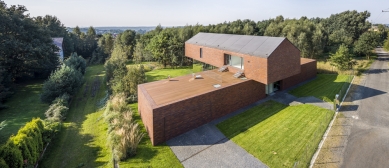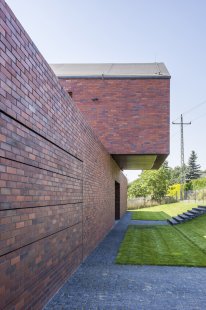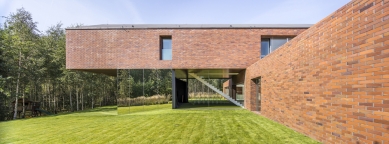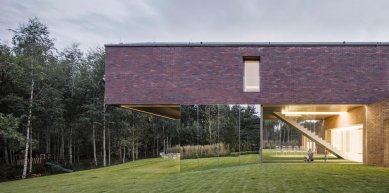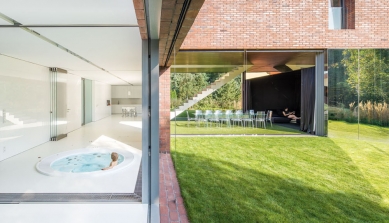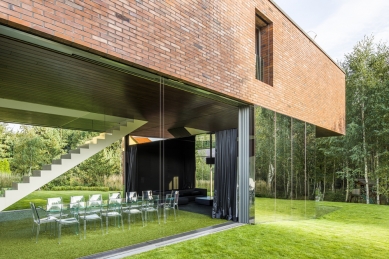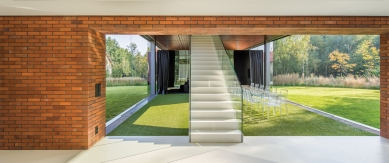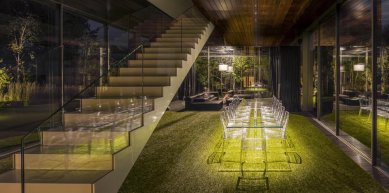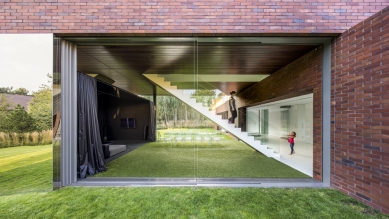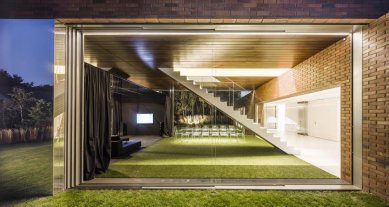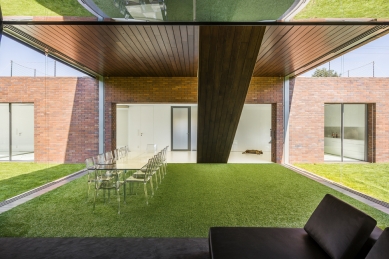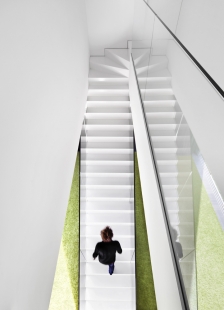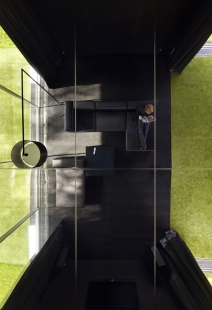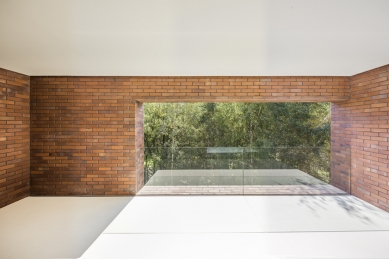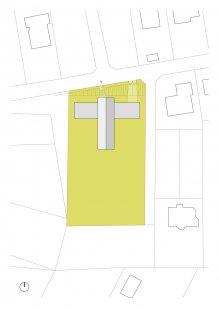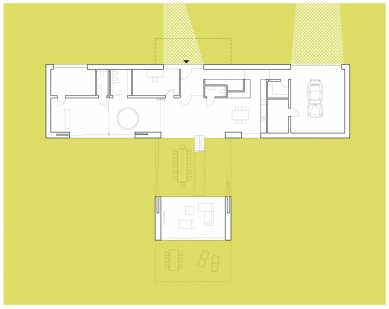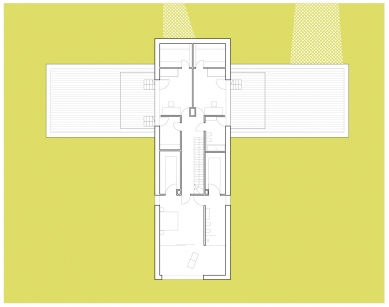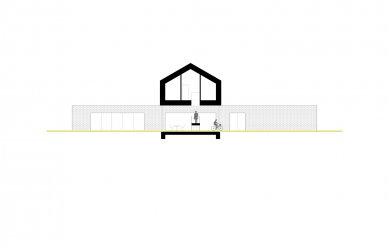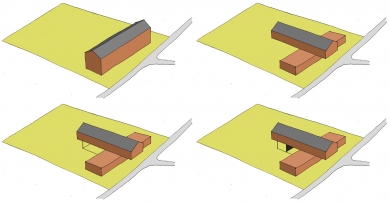
Living-Garden House in Katowice

Living-Garden Home attempts at redefining the single-family house to integrate architecture with nature. The classic household division into the living area, located in the ground floor and the sleeping area above was transformed into new typology. During the day, we should be able to interact with the environment, with the light (cognitive functions), whereas in the night, we appreciate separation from the environment (safety function). Dichotomy is thus born: the ground floor opens up to the garden under the floor ledge, whereas the first floor is more introvert. Living space merges with nature, glass partitions are the sole protection against the weather. The floor extends the lawn by utilizing grass mimicking materials. The living room has become the living-garden. We live in the garden during the day and enclose in the cocoon at night – an idea derived from the past. Our ancestors would harvest food in daylight while sheltering in the trees at night. Living-Garden restores the original order.
project description — The house was built in Katowice, Poland. The form and materials represent local traditions – of Silesian worker settlements featuring red masonry walls and asphalt-lined gable roofs. Moreover, local plans enforced traditional development, which was, however, ultimately transformed – to ensure maximum privacy, the ground floor was set parallel to the road for the building to isolate the backyard garden from the road, whereas the first floor was shifted at 90 degrees to overhang and penetrate the garden. The building has thus acquired two faces. Street-side, it is enclosed, inaccessible, raising the comfort of its residents, guaranteeing maximum intimacy. In turn, garden-side, it is full of glazed surfaces overlooking the environment. A living garden is created under the ledge. On warm days, after removing the glass partitions, indoor space merges with the garden, the flooring transforms into grass.
The magnificent ledge rests on two reinforced concrete walls covered with stainless steel to produce a dematerializing effect. Indoor space penetrates the garden both physically and deceptively.
Wall fragments in the living section meet the expectations of investors to form a piece of intimate space (a home cinema is created after closing the curtains).
The first floor is the night section overlooking terraces located on the flat roof of the ground floor.
sustainable development — Living-Garden is a green, A-energy class building. Perfectly insulated (thick walls, multilayer thermal glass), the house does not require high energy for heating and remains cool in the summer. The ledge protects the ground floor against overheating. Local materials were mainly used: brick from the brickyard nearby and wood (terrace and ledge lining) from the sawmill nearby.
With its structure, Living-Garden House enforces an environmentally friendly lifestyle – opening up to the garden enforces coexistence with nature, subjecting to its rhythm.
Soon, the blend of architecture and the environment will be fuller: applying specific grass or moss types in the living section will improve the internal microclimate, improve the quality of air, and, in result, create a healthier space for living. More ethereal membranes will ultimately cease to separate us from the world.
Houses will cease to interfere with the landscape.
Living-Garden House is a step towards this ideal. It makes the residents aware that they are a part of a bigger ecosystem.
project description — The house was built in Katowice, Poland. The form and materials represent local traditions – of Silesian worker settlements featuring red masonry walls and asphalt-lined gable roofs. Moreover, local plans enforced traditional development, which was, however, ultimately transformed – to ensure maximum privacy, the ground floor was set parallel to the road for the building to isolate the backyard garden from the road, whereas the first floor was shifted at 90 degrees to overhang and penetrate the garden. The building has thus acquired two faces. Street-side, it is enclosed, inaccessible, raising the comfort of its residents, guaranteeing maximum intimacy. In turn, garden-side, it is full of glazed surfaces overlooking the environment. A living garden is created under the ledge. On warm days, after removing the glass partitions, indoor space merges with the garden, the flooring transforms into grass.
The magnificent ledge rests on two reinforced concrete walls covered with stainless steel to produce a dematerializing effect. Indoor space penetrates the garden both physically and deceptively.
Wall fragments in the living section meet the expectations of investors to form a piece of intimate space (a home cinema is created after closing the curtains).
The first floor is the night section overlooking terraces located on the flat roof of the ground floor.
sustainable development — Living-Garden is a green, A-energy class building. Perfectly insulated (thick walls, multilayer thermal glass), the house does not require high energy for heating and remains cool in the summer. The ledge protects the ground floor against overheating. Local materials were mainly used: brick from the brickyard nearby and wood (terrace and ledge lining) from the sawmill nearby.
With its structure, Living-Garden House enforces an environmentally friendly lifestyle – opening up to the garden enforces coexistence with nature, subjecting to its rhythm.
Soon, the blend of architecture and the environment will be fuller: applying specific grass or moss types in the living section will improve the internal microclimate, improve the quality of air, and, in result, create a healthier space for living. More ethereal membranes will ultimately cease to separate us from the world.
Houses will cease to interfere with the landscape.
Living-Garden House is a step towards this ideal. It makes the residents aware that they are a part of a bigger ecosystem.
0 comments
add comment


